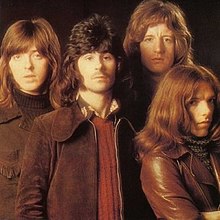Straight Up (album)
| Straight Up | ||||
|---|---|---|---|---|
 |
||||
| Studio album by Badfinger | ||||
| Released | 13 December 1971 (US) 11 February 1972 (UK) |
|||
| Recorded | 30 May–6 October 1971 Abbey Road Studios, AIR Studios, Command Studios, London |
|||
| Genre | Power pop | |||
| Length | 42:11 | |||
| Label | Apple | |||
| Producer | Todd Rundgren, George Harrison | |||
| Badfinger chronology | ||||
|
||||
| Singles from Straight Up | ||||
|
||||
| Professional ratings | |
|---|---|
| Review scores | |
| Source | Rating |
| AllMusic | |
| Robert Christgau | B– |
| Encyclopedia of Popular Music | |
| The Great Rock Discography | 7/10 |
| Mojo | |
| MusicHound | 5/5 |
| Q | |
| Record Collector | |
| The Rolling Stone Album Guide | |
| Uncut | |
Straight Up is the third album by British rock band Badfinger, released in December 1971 in the United States and February 1972 in Britain. Issued on the Beatles' Apple record label, it includes the hit singles "Day After Day" and "Baby Blue", and the similarly popular "Name of the Game", all of which were written by singer and guitarist Pete Ham. The album marked a departure from the more rock-oriented sound of Badfinger's previous releases, partly as a result of intervention by Apple Records regarding the band's musical direction. Although Straight Up received a mixed response from critics on release, many reviewers now regard it as the band's best album. Rolling Stone critic David Fricke has referred to it as "Badfinger's power-pop apex".
Production on what became Straight Up lasted nine months, at the start of which the group made an album's worth of recordings with producer Geoff Emerick, in between their touring commitments. Once Apple had decided to shelve these recordings, George Harrison took over production, only for him to become indisposed with events associated with the Concert for Bangladesh, at which Badfinger also performed. Harrison then handed the project to American producer Todd Rundgren, who oversaw recording for most of the album.
Straight Up was reissued on CD in 1993, with bonus tracks, and remastered again in 2010.
Badfinger preceded the recording of their third album, Straight Up, with the well-received No Dice (1970), and a series of acclaimed shows at Urgano's in New York that helped establish the group in America. Out of appreciation for the band's contributions to his first post-Beatles solo album, All Things Must Pass, George Harrison introduced Badfinger on their opening night at Urgano's, about which Janis Schacht of Circus reported: "For a while, most people watched George Harrison watching Badfinger, then everyone noticed how good Badfinger were – good enough to draw attention away from a former Beatle."
...
Wikipedia
